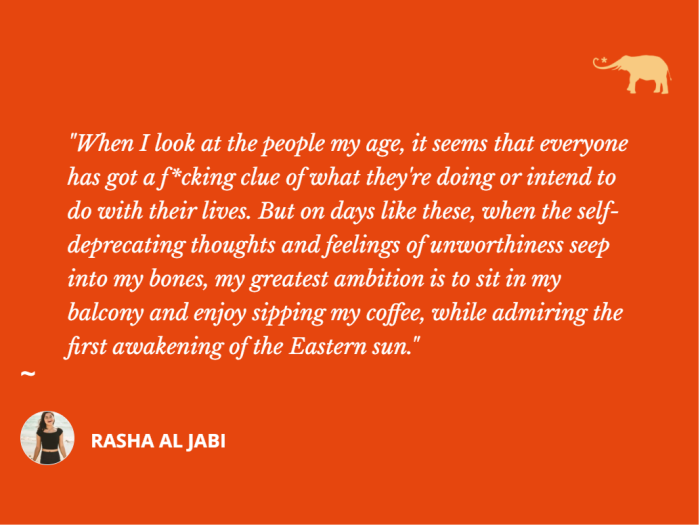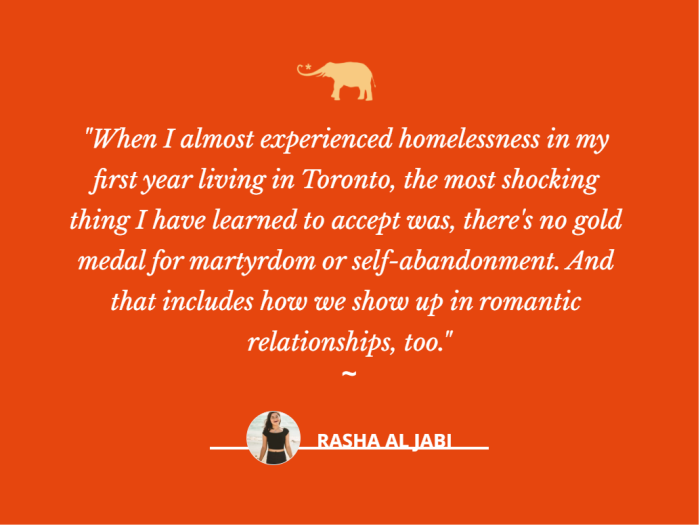I felt the forceful energy of anger slowly pulsating through my veins.
It had been hours since I’d met up with him.
He felt kind, present, receptive, and available. But instead of being grateful and relishing in the experience of a new relationship, I was feeling resentful, shameful, confused, frazzled, disorganized, off-centered, angry—as I often would every time we spent the day together.
The anxiety of my confusion had quickly escalated. I found myself spiraling down into a rabbit hole of self-destructive, self-deprecating thoughts. A few thoughts, in particular, stood out. I recall vividly thinking how I could not trust myself or even figure out how I felt, what I needed, and whether or not I wanted to proceed with a relationship.
“Is it the right one for me? Is there even such a thing as the ‘right’ one?”
Minutes later, I was so consumed by a myriad of emotions: shame, frustration, and self-doubt. I couldn’t continue sitting at my desk or looking at the words on my screen. I knew I had to mobilize the anger I was feeling to get some release. So I decided to go for a short run, ignoring the weather forecast warning of a storm and the -16 degree blazing cold.
I am turning 33 this June. A year ago, at the height of a global pandemic, I relocated to a new country, leaving behind family, friends, a job, and a familiar comfort zone because I didn’t want to betray myself by living a life that did not measure up to the values I held close to my heart. In the process, I almost became homeless following a fallout with a family member.
I was resilient, strong, and determined.
But why can’t I make up my mind already?
Why can’t I accept the warmth and affection of someone who seems kind, loving, and caring?
Am I not attracted to that person or do I simply need more time to figure out how I feel?
Is it my dysregulated nervous system that is unable to process information and accurately relate to another human being, or is it my gut feeling telling me something that I didn’t know?
Is it healthy relating or trauma bonding?
Is it a projection of all my unmet needs and fantasies, or is it a mature relationship where I am finally able to explore myself within the confines of a safe container?
Am I moving too fast or am I finally able to remain open, engaged, and receptive by allowing another human into the places where I am scared to explore on my own?
Is it codependent or healthy interdependence?
Does it really feel safe or have I been so traumatized that any glimpse of safety feels better than sitting with my own murky feelings?
Are we really not compatible or have I mistaken consistent and calm for boring and lack of passion, because hypervigilance, unavailability, and accepting breadcrumbs are the only narratives for love that I ever knew?
Oftentimes, when I look at the people my age, it seems that everyone has got a f*cking clue of what they’re doing or intend to do with their lives. But on days like these, when the self-deprecating thoughts and feelings of unworthiness seep into my bones, my greatest ambition is to sit in my balcony and enjoy sipping my coffee, while admiring the first awakening of the Eastern sun.
In trauma literature, it is said that as relational beings, our attachment styles are formed during the first years we share with our primary caregiver/s. If we had one or two caretakers who were present, aware, and attuned to our physical, emotional, and cognitive needs, a secure attachment is formed, which then carves the way we romantically relate in our later adult years.
However, anything short of a safe, relatable, and consistent caretaker, or even the presence of an inconsistent one who might be abusive, narcissistic, neglectful, or simply unaware may lead to the development of one of the other attachment styles: anxious, avoidant, or disorganized.
According to this source from The Attachment Project:
“Adults with a disorganized attachment style lack a coherent approach towards relationships. On the one hand, they want to belong. They want to love and be loved. While on the other hand, they are afraid to let anyone in. They have a strong fear that the people who are closest to them will hurt them.”
It further elaborates:
“They have trouble believing that their partner will love and support them as they are. These adults expect and are waiting for the rejection, disappointment, and hurt to come. In their perception, it is inevitable.”
It is no wonder then that for as long as I could remember, I’ve gravitated toward partners who were distant, avoidant, unavailable, difficult, or derivatives of a complicated past—one that I recognized from my own upbringing.
This is what often happens when we come from a past of scarcity and a mindset of “never enoughness.” When we equate passion, love, and intimacy with the level of challenge and difficulty our partner exhibits. Or when we hold an ingrained, unconscious belief that we can’t really get hurt if we choose unavailable partners, because our failure is a reflection of their unavailability—not our inability to contain a relationship. So the weight of their rejection and our failure feels much more tolerable compared to the rejection we face from available partners whom we desire.
It is said that love can be one of the most expansive, most liberating experiences we could ever imagine. But if we come from a background where pain, confusion, suffering, and scraping the bottom were necessary to earn love, being in a safe relationship might feel excruciating. The dysregulated, frozen state of our nervous system does not have a template of what healthy love feels like or resembles.
In my case, and with this new, explorative relationship, I find it exceptionally challenging to accept that I am worthy of love simply because another human being is interested in giving me their undivided affection, warmth, and would like to explore the possibility of turning their feelings into a long-term project.
Trauma bonding might often get confused with intense pleasure or lovemaking, while slow, consistent, and open discovery might feel boring, empty, or even foreign.
And sometimes, it isn’t even a trauma bond or our nervous system sabotaging the potential of a healthy relationship. It is still possible that we might encounter warm, caring people with whom we are incompatible, as they might not reflect our ambitions, dreams, desires, or long-term goals.
But for the disorganized, frazzled nervous system, this can pose an exceptional challenge, because we might not easily have access to the information our bodies are signaling to us—especially if our preferred coping mechanism, as it was in my case, is to shut down or fawn to avoid the pain of rejection we grew up holding.
We start to believe that it is never safe to tune into the sensations of our bodies, so each time it signals visceral information that tells us something about someone, something, a situation, or ourselves, we immediately shut it off. We become masters at gaslighting ourselves, not being able to trust our own ability to discern how we really feel in the moment from our reaction to an old trauma trigger.
Am I reacting from the present moment or the past?
Am I responding to my partner or my father/mother/ex-lover?
Do I trust the visceral information my body is giving me or is it being rewired to accept safety and love in the present moment, which will feel unsafe until it feels familiar?
When we’ve been operating in a people-pleasing mode for so long, it can be difficult to discern what we truly desire in the long run from what we need in the moment, as this means tapping into the whole range of our body sensations—including the areas that we’ve learned to exile: the wounded, the needy, the confused, the scared inner child who is seeking love, validation, and presence.
We even notice that within our intimate relationships when we’re unable to ask for simple things such as, “I want you to hold me,” or “I would like to be soothed right now,” or “Can you just hug me and sit with me in silence while I make sense of how I feel?”
They are simple requests that often challenge our hardwired modus operandi to reject our basic, most human need for love and connection with another human being. To be held when we’re frustrated, to be caressed when we’re frightened, to know that we’re not alone when we don’t hold all the answers to life’s confusions and challenges, and to be seen and accepted for the entirety of what makes us humans—flaws and all.
How beautiful, how simple, yet how hard this journey of simply accepting, being, and learning through love is?
Each time I find myself spiraling down into my self-deprecating feelings, I hold the lines of the 13th century Sufi poet, Rumi:
“Your task is not to seek for love, but merely to seek and find all the barriers within yourself that you have built against it.”
Isn’t it ironic that the most basic thing we could do is to accept love, yet sometimes, even this sheer, simple task feels like we’re fighting against ourselves?
Isn’t it strange how quick we are to flee when someone offers us love willingly, and says all the right things we’ve longed to hear, but have no issue scraping the bottom for a few dry breadcrumbs?
When did we, as a society, learn that scarcity, people-pleasing, and self-rejection are better than self-acceptance, self-compassion, and receiving love?
When did we learn that love is only crowned worthy when it comes with all sorts of hurdles, including self-deprecation and putting our nervous system into a state of fear and hypervigilance, because that is how passion and excitement are “supposed to” feel?
Who taught us such bullsh*t?
When I almost experienced homelessness in my first year living in Toronto, the most shocking thing I learned to accept was there’s no gold medal for martyrdom or self-abandonment. And that includes how we show up in romantic relationships, too.
There is no one waiting for us at the finish line with a trophy. There is only us, and our tender, precious heart.
Whether we choose to hold on to or let go of love, that will not change the internal narrative of how we feel about ourselves, or the stories of scarcity and unworthiness we hold.
A love story will never spare us the difficult journey of our lifetime: finding home within ourselves.
But as we embark on this journey, let us not forget that we exist within the wider fabric of humanity. Let us not make walls out of our independence that no trespasser can ever cross.
Let us make room for new love stories to unfold, even if for a brief while, even if for the present moment.
We will never know how our story will end unless we begin living it. So we might as well start somewhere.









Read 12 comments and reply